 To be honest, I feel strangely blase about the 70s. I missed the decade by a smooth four years and (from all the Wise Ones tell me) didn’t miss terribly much. Yet all evidence would indicate the decade was a junction point for speculative fiction, particularly SF film. Ten little years brought us Star Wars, Alien, Close Encounters, Halloween, and thus the plot of neigh-on every crap film to come out of the Hollywood for the next thirty-odd years.
To be honest, I feel strangely blase about the 70s. I missed the decade by a smooth four years and (from all the Wise Ones tell me) didn’t miss terribly much. Yet all evidence would indicate the decade was a junction point for speculative fiction, particularly SF film. Ten little years brought us Star Wars, Alien, Close Encounters, Halloween, and thus the plot of neigh-on every crap film to come out of the Hollywood for the next thirty-odd years.
But forget all those flicks: time to into the darkened glass of the mid-70s, a fearful and frightening time. Jaws had just ripped up the screen and brought forth the Summer Blockbuster. Five days later, tonight’s subject sneaked into theaters, unloved and poorly announced, soon to be eclipsed by its shark-and-naked-girl-centered competition.
Rollerball is a story of the future, a brightly lit, prosaic place made all the more dystopic by the apparent comfort of its inhabitants. There are no governments anymore, you see; no nations. Just a small conglomerate of extreamly powerful companies that control, capital-E, Everything. They provide, protect, and micromanage the well-being of every man, woman and child on Earth and all they ask in return is obedience. Thoughtless, flaccid obedience.
But don’t worry, this dystopia isn’t so bad. After all, they still have sports. Or rather, the sport: Rollerball, a viral mutation of our most violent past times. Padded skaters and armored motorcyclists must bash their way around a gigantic, sloped ring, with opposing goals on either side. Players dress in standard football regalia, plus the skates and studded S&M gloves. The ball is a grapefruit sized chunk of steel, fired into play from a gun on the outer rim (and they call it “symbolism!”). Injury is common, death only a bit less so. And yet some men survive their time in the blender. Some even thrive.
Like Jonathan (James Caan), ten-year vet of the Huston…uh….Team. Ten years is an awful long time for any pro-athlete, to say nothing of a Rollerball champion. The very fact that Jonathan can still control his bowl movements is enough to astonish this critic. With the Championship fast approaching, The Powers That Be decide it might be best for Jonathan to quit while he’s ahead.
Jonathan, being human, asks the inevitable “Whuz up wit’ dat?” The Hichcockian Mr. Bartholomew (The Great John Houseman), being an avatar of Capitalist Evil, gives him the inevitable corporate blowoff. Retreating to his lavish, sports hero’s mansion (decked straight out of the middle 70s) Our Protagonist begins to ponder life without Rollerball…soon realizing (duh) that Rollerball has become his whole life. After all, the Company took away his One True Love years ago…some executive wanted her, so off she went. His family is…not talked about, and his friends…well, shucks, 99.7 percent of them play Rollerball.
So Jonathan, by the simple act of suiting up for a semi-final game, violates the Highest Law of the Land (“Do what we say, or else. Now dance, puppet”), which the Powers That Be are none too happy about. So they do what any Evil Corporation would do. Id’jet wants to play Rollerball, let him play Rollerball! See how he likes the game once we change the rules on his honky ass. There are plenty of ways to die in Rollerball by sheer dumb luck…imagine what might happen if the players were encouraged to actively murder one another…
Like most sci-fi of its strata, Rollerball paints its message in gigantic flaming letters across the well-constructed lawns of all your favorite corporate office parks. This is a movie about violence, and the societal worship of same. It is a movie about individual choice overruling the wishes of our corporate masters. It is about bloodsport: why we watch it, why we want it, and what purpose it serves in our society.
It is a film based on a short story by William Harrison. Director Norman (Moonstruck, The Hurricane) Jewison read the script and apparently knew he had to make this movie. Being Canadian, Mr. Jewison has (by his own admission) wasted a good part of his life watching hockey. And it shows. The three games that handily align with the three acts of our narrative are fast paced and remarkably easy to look at. God bless the days before shotgun editing.
Unfortunately, most of our time is spent between games, as Jonathan (slowly but surely) chips away at the mystery of his forced retirement. He goes to the Library, only to find there are no books. He asks his middle-management friend Cletus (Moses “Bumpy Jonas” Gun, no one’s slack-jawed yokle) to shake some trees around the water cooler, but Cletus comes back empty-handed. He has several repetitive talks with Mr. Bartholomew…no help there, and no help for us either.
All of this is intercut with scenes of the team, as they gear up for the semi-final mach against Tokyo. They’re all a bunch of testosterone imbalanced alpha males. Yes, thank you. They’re jingoistic, narrow minded, easily led sheeple, living out empty lives dedicated to fulfilling their most immediate, selfish needs. Yes, thank you, I know. Along with everyone else in this parallel future. Yes, thank you, I get it. Now could we please move things forward?
Here’s the thing for all you filmmakers out there: No matter how interested you are in your future, you have to give me some reason to be interested as well. The burden of proof is on you, as the storyteller. Tension is fine. Mysteries are great. But the film holds Jonathan in limbo for over an hour, and us along with him. He drifts from one shallow corporate shill to another, without gaining the slightest thread of new information.
Now, one could argue that this long middle passage is supposed to lull us into unconsciousness (therefore multiplying the impact of the Huston vs. Tokyo game and its brutally unpleasant consequences). But you won’t catch me doing that. Whatever its high points (and there are a few) I honestly can’t recommend a movie that holds its plot up in traffic for this long.
Besides, I don’t think this movie gives our corporate masters enough credit. After all, they own the frickin’ world. How can a athlete (even a highly skilled, long-living one) possibly threaten that? Why not just let nature take its course? Jonny boy’s a ten-year vet, he’s bound to fall down sometime. Unless he’s, you know, a mutant or something.
The answer? “It’s not a game a man is supposed to grow strong into,” Bartholomew says. Yet Jonathan does. And he loves it. Over and over he says, “I love this game” in the heat of the moment. Making matters worse, Jonathan is a celebrity. His is the longest career in Rollerball history. Yet Bartholomew says the whole point of the game is to “show the futility of individual effort.” (Because, as every MCI employee knows, it’s all about Teamwork). Jonathan’s continued success (and, later, his very existence) negates this World View. Therefore, he must be destroyed, before he can become an example.
Still, I seriously doubt that, with all their money and power, they couldn’t find someone, somewhere, willing to break into Jonathan’s house in the middle of the night and give him a quick double tap to the back of the head. Control of the world’s media could easily sabotage Jonathan’s Martyr Potential. If people even watch the news in this future. All anyone seems to watch is Rollerball.
Meanwhile, I’m watching James Caan, wondering if he has more than that one facial expression. Is that bemused, dopey look on his face just something you catch in Texas? Is every woman of the future a highly paid party accessory (shades of Soylent Green)? And when is Donald Pleasence going to pop in and ask from Bartholomew if he can borrow a cup of bald?
 Things pick up eventually…after a hundred and twenty-four minutes of standing, walking, talking, and pill-popping (on screen, thank you). Then it came to me in a flash: Rollerball has a serious structure problem. I don’t care what creative writing course you took, your first act should not be as long as your second and third combined.
Things pick up eventually…after a hundred and twenty-four minutes of standing, walking, talking, and pill-popping (on screen, thank you). Then it came to me in a flash: Rollerball has a serious structure problem. I don’t care what creative writing course you took, your first act should not be as long as your second and third combined.
The dialogue in Rollerball is sparse and utilitarian, apart from the occasional corporate speech. Nothing much stands out here. Acting is even harder to gauge as the performers are rarely called upon to express anything beyond stupefied complacence. Only John Beck seems to be having any fun, given that he gets to play the lecherous swine. John Houseman is the only real standout, by virtue of being an old pro. Everyone else is on auto pilot
Like most 70s sci-fi of high mind and low means, Rollerball is front-heavy, poorly paced, and not nearly as well acted as it needs to be. High ideals won’t get you a good movie…though they are deplorably scarce nowadays. If you’re absolutely starved for some high ideals, you should probably rent Logan’s Run. But if you absolutely must go rolling, be prepared. You’ll have to lean on that fast forward button.


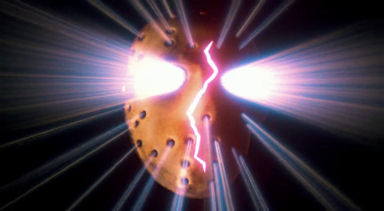 By the time I’d made it all the way to tonight’s piece I was going on 14 and even then Younger Me could sense the hurk and jerk of a movie series tottering on its last legs, begging for a fresh idea to blow through its sagging sails. At the time, Young Me found it odd that this series of films, centered as they are around a homicidal pseudo-zombie, could be so lacking in life.
By the time I’d made it all the way to tonight’s piece I was going on 14 and even then Younger Me could sense the hurk and jerk of a movie series tottering on its last legs, begging for a fresh idea to blow through its sagging sails. At the time, Young Me found it odd that this series of films, centered as they are around a homicidal pseudo-zombie, could be so lacking in life.
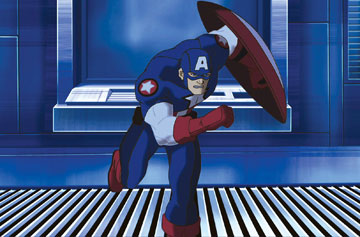
 I’ve never been happy with the Man of Steel’s celluloid incarnations for the same reason cited by all the comics industry pros: the damn Boy Scout is a real chore to write, and a stone cold bitch to write well. Years of previous (mis)conceptions about just who and what he is don’t help. Neither does the fact that his world (by which I mean the 1930s) has moved on.
I’ve never been happy with the Man of Steel’s celluloid incarnations for the same reason cited by all the comics industry pros: the damn Boy Scout is a real chore to write, and a stone cold bitch to write well. Years of previous (mis)conceptions about just who and what he is don’t help. Neither does the fact that his world (by which I mean the 1930s) has moved on.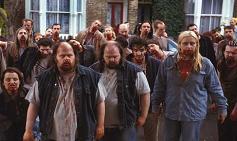 I may have reduced myself to a monthly reviewing schedule, I may have gone through the interminable burnout of academic paper writing, and I may have surrendered for a while there to myopic self-defeatism (“Oh, god, what can I possibly do? What’s the bloody point to it all if nobody cares anyway?”) but, by the lightning, I’m still here. And I still believe in the Cause. You need people like me. You need me to play the fuckin’ bad guy. Well say, “Hello” to the bad guy because, as I mentioned, I am still here.
I may have reduced myself to a monthly reviewing schedule, I may have gone through the interminable burnout of academic paper writing, and I may have surrendered for a while there to myopic self-defeatism (“Oh, god, what can I possibly do? What’s the bloody point to it all if nobody cares anyway?”) but, by the lightning, I’m still here. And I still believe in the Cause. You need people like me. You need me to play the fuckin’ bad guy. Well say, “Hello” to the bad guy because, as I mentioned, I am still here.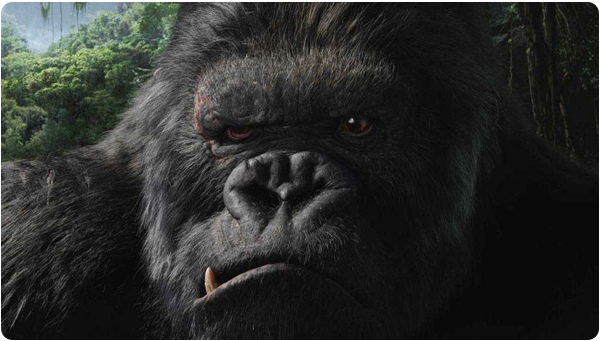 I have issues with
I have issues with 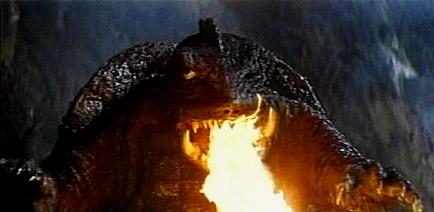 Gamera vs. Barugon is the high point of the original Gamera franchise. After the (relative) success of
Gamera vs. Barugon is the high point of the original Gamera franchise. After the (relative) success of 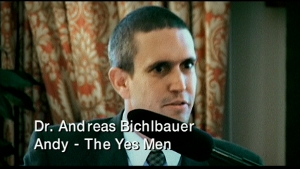 The Yes Men, a not-so-gruesome twosome of Mike Bonanno and Andy Bichlbaum, began their adventures in “identity correction” with a wit, a prayer, and a web site, gwbush.com. Back in 1999, Bonanno and Bichlbaum turned their little domain into the preeminent piece of web-based anti-Bush satire. The Bush campaign, like any good political hit squad, responded with Cease and Desist orders and pitched a bitched about gwbush.com to the Federal Election’s Commission. This generated a minor media kerfuffle for the Governor and a bit of free publicity for Our Heroes.
The Yes Men, a not-so-gruesome twosome of Mike Bonanno and Andy Bichlbaum, began their adventures in “identity correction” with a wit, a prayer, and a web site, gwbush.com. Back in 1999, Bonanno and Bichlbaum turned their little domain into the preeminent piece of web-based anti-Bush satire. The Bush campaign, like any good political hit squad, responded with Cease and Desist orders and pitched a bitched about gwbush.com to the Federal Election’s Commission. This generated a minor media kerfuffle for the Governor and a bit of free publicity for Our Heroes.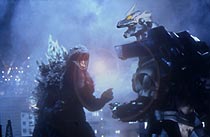 Let’s dispense with the introductions, shall we?
Let’s dispense with the introductions, shall we?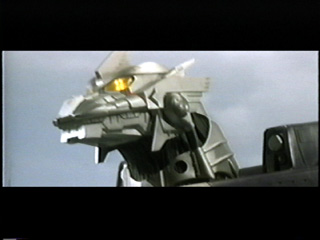 I’ll get to that eventually, but in the meantime I wonder if Toho’s setting up some sort of Crisis on Infinite Earth‘s senario with all these wacky, parallel dimensions appearing and disappearing at will? Will the battle-hardened, Kenny-laden heroes of the Godzilla Multiverse be joining forces against some giant, rubber suited version of the Anti-Monitor at some time in the Not Too Distant Future? Have I finally succumb to sleep deprivation? Or am I merely deprived of honest-to-God good Godzilla films?
I’ll get to that eventually, but in the meantime I wonder if Toho’s setting up some sort of Crisis on Infinite Earth‘s senario with all these wacky, parallel dimensions appearing and disappearing at will? Will the battle-hardened, Kenny-laden heroes of the Godzilla Multiverse be joining forces against some giant, rubber suited version of the Anti-Monitor at some time in the Not Too Distant Future? Have I finally succumb to sleep deprivation? Or am I merely deprived of honest-to-God good Godzilla films?
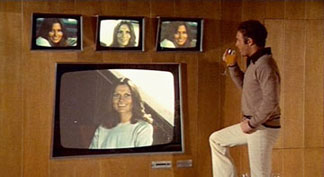 To be honest, I feel strangely blase about the 70s. I missed the decade by a smooth four years and (from all the Wise Ones tell me) didn’t miss terribly much. Yet all evidence would indicate the decade was a junction point for speculative fiction, particularly SF film. Ten little years brought us Star Wars,
To be honest, I feel strangely blase about the 70s. I missed the decade by a smooth four years and (from all the Wise Ones tell me) didn’t miss terribly much. Yet all evidence would indicate the decade was a junction point for speculative fiction, particularly SF film. Ten little years brought us Star Wars, 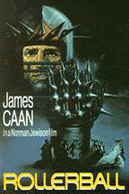 Things pick up eventually…after a hundred and twenty-four minutes of standing, walking, talking, and pill-popping (on screen, thank you). Then it came to me in a flash: Rollerball has a serious structure problem. I don’t care what creative writing course you took, your first act should not be as long as your second and third combined.
Things pick up eventually…after a hundred and twenty-four minutes of standing, walking, talking, and pill-popping (on screen, thank you). Then it came to me in a flash: Rollerball has a serious structure problem. I don’t care what creative writing course you took, your first act should not be as long as your second and third combined.